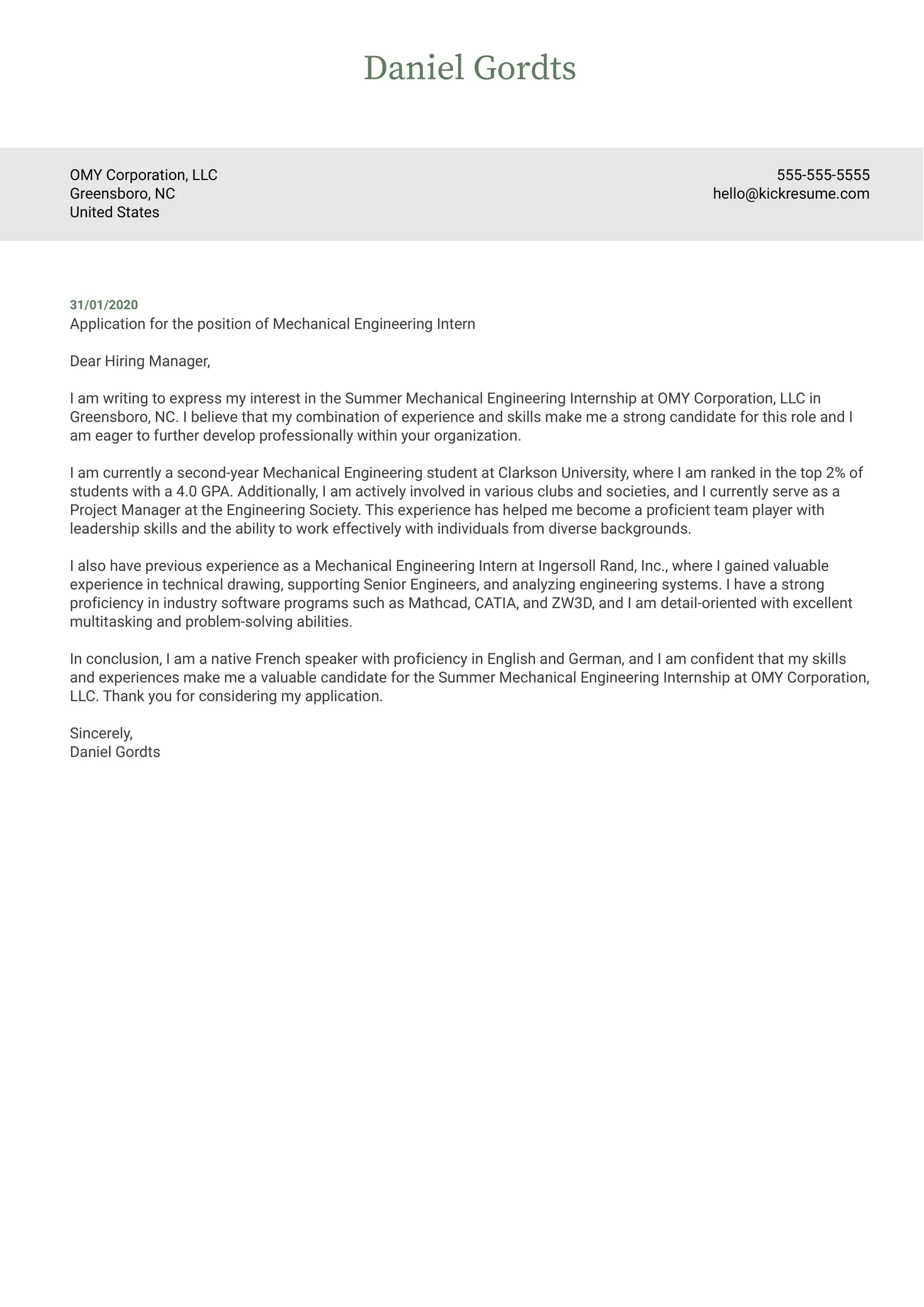What is an Engineering Internship Cover Letter?
An engineering internship cover letter is a crucial document that accompanies your resume when applying for an internship position in the field of engineering. It serves as your introduction to the hiring manager and provides an opportunity to showcase your qualifications, skills, and enthusiasm for the role. Unlike a resume, which provides a factual overview of your experience, a cover letter allows you to express your personality, explain why you’re a good fit for the specific internship, and demonstrate your genuine interest in the company and the opportunity. It’s a chance to make a strong first impression and set yourself apart from other applicants.
Importance of a Great Cover Letter
A well-crafted cover letter is important for several reasons. Firstly, it provides context to your resume. It allows you to explain gaps in your experience, highlight specific projects or skills that align with the internship requirements, and elaborate on your career aspirations. Secondly, a strong cover letter demonstrates your communication skills, which are essential in any engineering role. The ability to articulate your thoughts clearly, concisely, and professionally can significantly increase your chances of getting noticed. Lastly, a great cover letter conveys your enthusiasm and passion for engineering, showing the hiring manager that you’re not just looking for a job but are genuinely interested in the company and the specific internship opportunity.
Key Components of an Engineering Internship Cover Letter
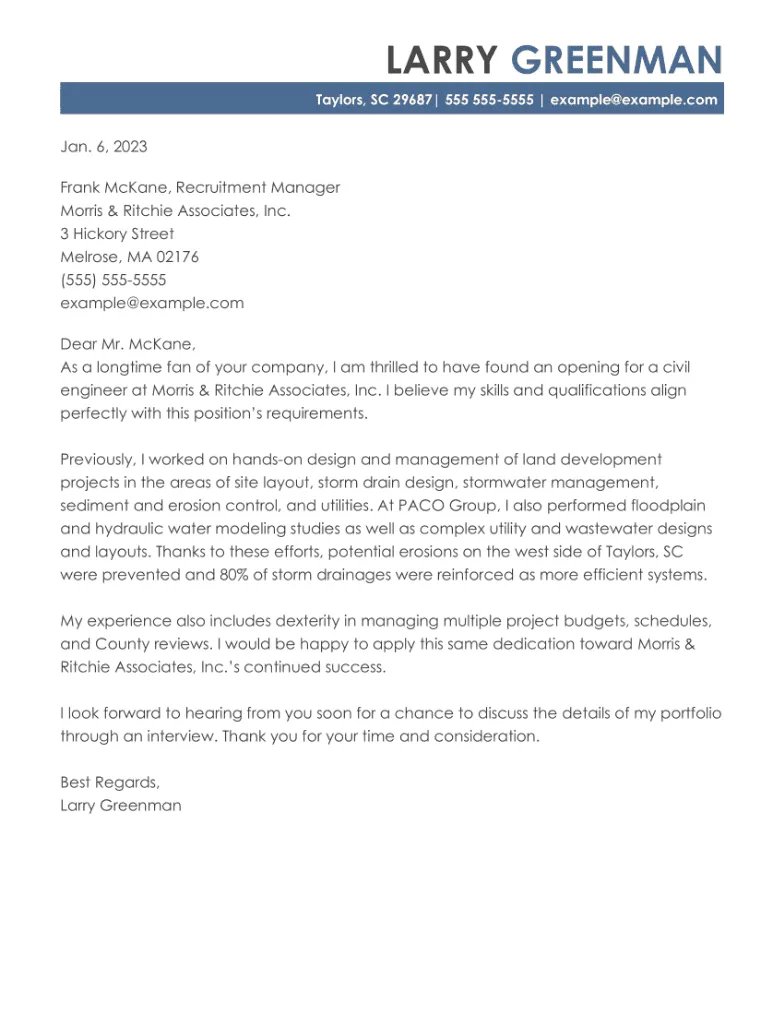
A successful engineering internship cover letter includes several key components that work together to create a compelling application. These components should be thoughtfully organized and presented in a clear and professional manner to make the best impression. The letter must be well-structured and easy to read.
Your Contact Information
Start with your contact information at the top of the letter. Include your full name, phone number, email address, and LinkedIn profile URL (if applicable). This makes it easy for the hiring manager to contact you if they’re interested in your application. Ensure that the contact information is up-to-date and professional. Consider using a professional-sounding email address (e.g., john.doe@email.com) instead of a casual one.
The Recruiter’s Information
If possible, address the cover letter to a specific person (e.g., the hiring manager or the internship coordinator). Research the company’s website or LinkedIn to find the name and title of the appropriate contact. If you can’t find a specific name, use a general salutation like “Dear Hiring Manager” or “Dear [Company Name] Internship Team”. This personalization shows that you’ve taken the time to research the company and shows your attention to detail.
A Professional Salutation
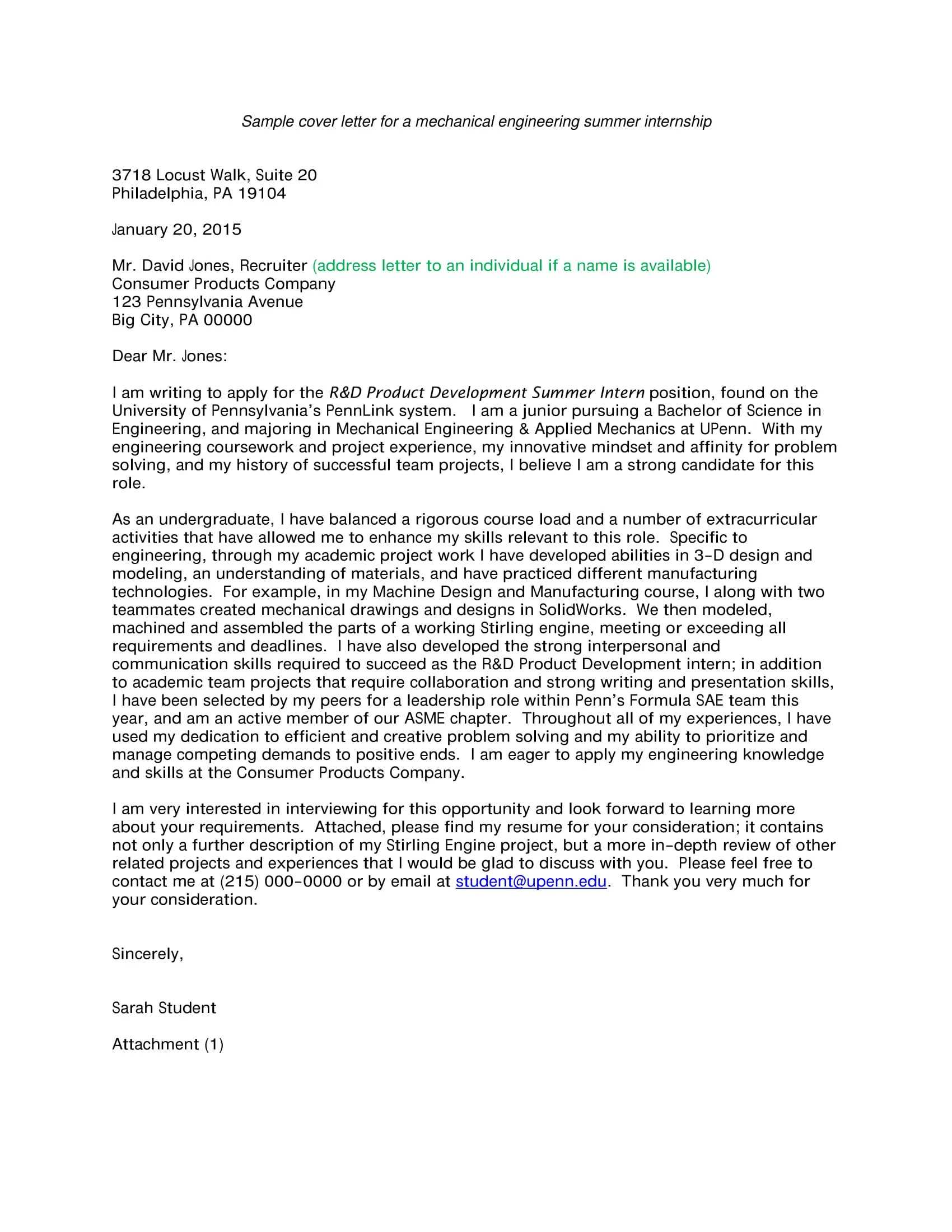
Begin the letter with a professional salutation, such as “Dear Mr./Ms. [Last Name]” or “Dear Hiring Manager”. Avoid informal greetings like “Hi” or “Hello”. This sets a professional tone and shows respect for the recipient. Always double-check the spelling of the recipient’s name.
Opening Paragraph Grab Attention
Your opening paragraph should immediately grab the reader’s attention. State the position you’re applying for and briefly explain where you found the opportunity. Then, quickly highlight your most relevant skills or experiences, and express your enthusiasm for the internship and the company. Keep it concise and focused, setting the stage for the rest of your letter.
Highlight Your Skills and Experience
The body of your cover letter is where you showcase your skills and experience. Explain how your qualifications align with the internship’s requirements. Provide specific examples of your technical skills, projects, and relevant coursework. Tailor your letter to match the specific requirements listed in the job description. Use keywords from the job posting to show that you’ve read and understood the requirements.
Technical Skills
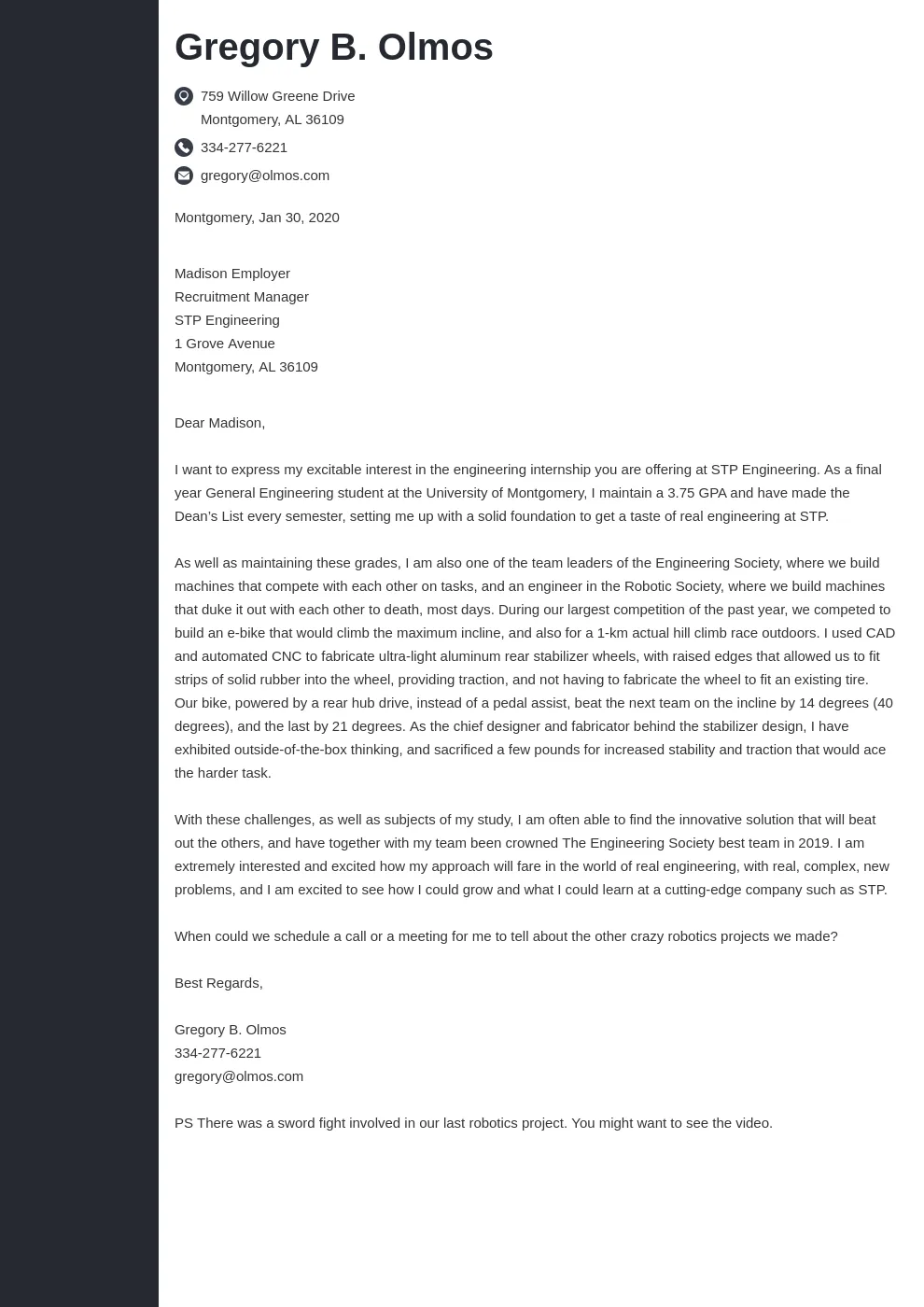
Engineering internships often require specific technical skills. List any relevant skills you possess, such as proficiency in programming languages (e.g., Python, C++), CAD software (e.g., AutoCAD, SolidWorks), simulation tools, or data analysis techniques. Provide examples of how you have used these skills in past projects or coursework. Make sure that the listed skills align with what the internship requires. Mention any experience with specific industry-standard software or tools.
Soft Skills
In addition to technical skills, emphasize your soft skills, such as teamwork, communication, problem-solving, and time management. Provide examples of situations where you’ve demonstrated these skills. For example, describe how you collaborated with a team on a project, presented technical information to a non-technical audience, or resolved a challenging problem. Show how your soft skills will help you contribute to the team and succeed in the internship.
Quantify Your Achievements
Whenever possible, quantify your achievements to demonstrate your impact. Instead of saying, “I improved project efficiency,” say “I improved project efficiency by 15% by implementing a new workflow.” Use numbers, percentages, or other metrics to showcase your accomplishments. Quantifiable achievements provide concrete evidence of your abilities and make your cover letter more compelling. Providing these numbers will help you stand out.
Showcase Your Passion and Interest
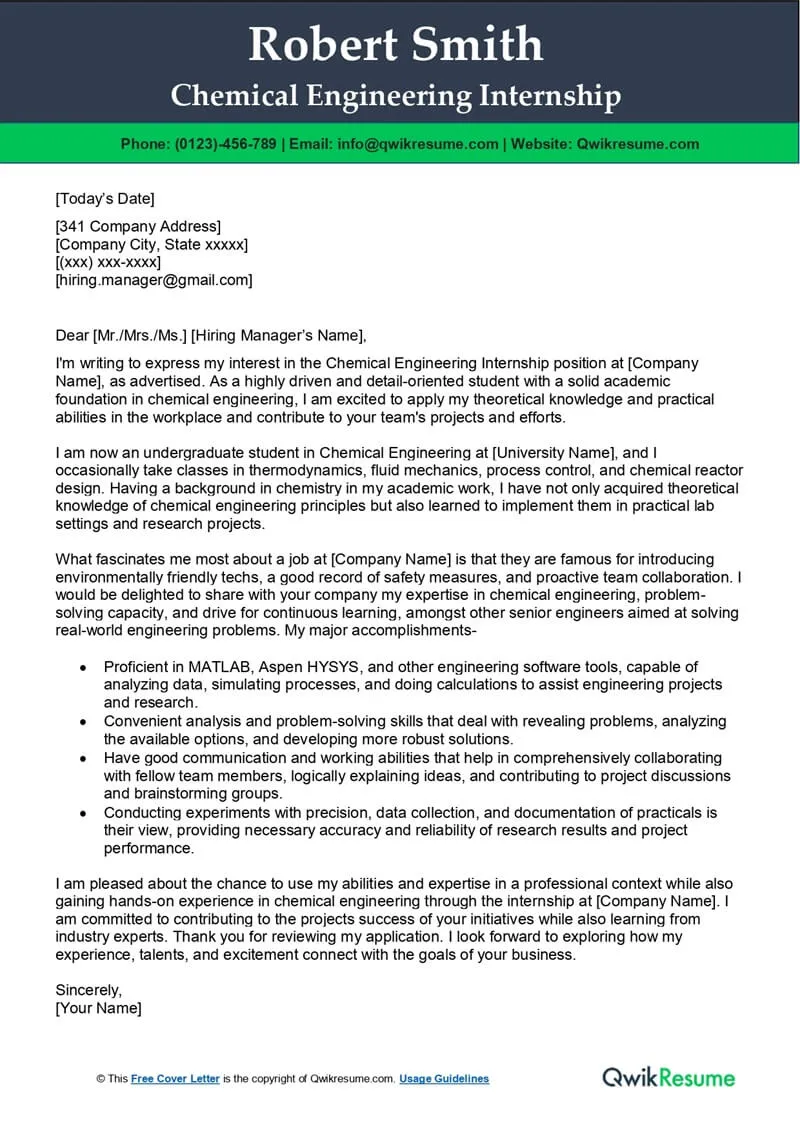
Express your passion for engineering and your genuine interest in the company. Explain why you’re excited about the specific internship opportunity and what you hope to gain from it. Mention any projects, research, or coursework that have fueled your interest in the field or the company’s work. This will convince the reader that you are enthusiastic about the opportunity. This also shows that you did your research.
Tailor Your Letter to the Role
Customize your cover letter for each internship you apply for. Don’t use a generic template. Research the company and the specific role to understand their needs and tailor your letter to address them. Highlight the skills and experiences that are most relevant to the internship’s requirements. Show how your qualifications align with the company’s values and goals. This level of customization demonstrates your interest and attention to detail, which will impress the hiring manager. This shows you did your research and are interested in this specific company.
Proofread and Edit
Before submitting your cover letter, carefully proofread and edit it for any errors in grammar, spelling, or punctuation. Ask a friend, professor, or career advisor to review it as well. A polished cover letter demonstrates professionalism and attention to detail. Errors can create a negative impression, so take the time to ensure your letter is error-free. The more eyes on your letter, the better.
Formatting Your Cover Letter
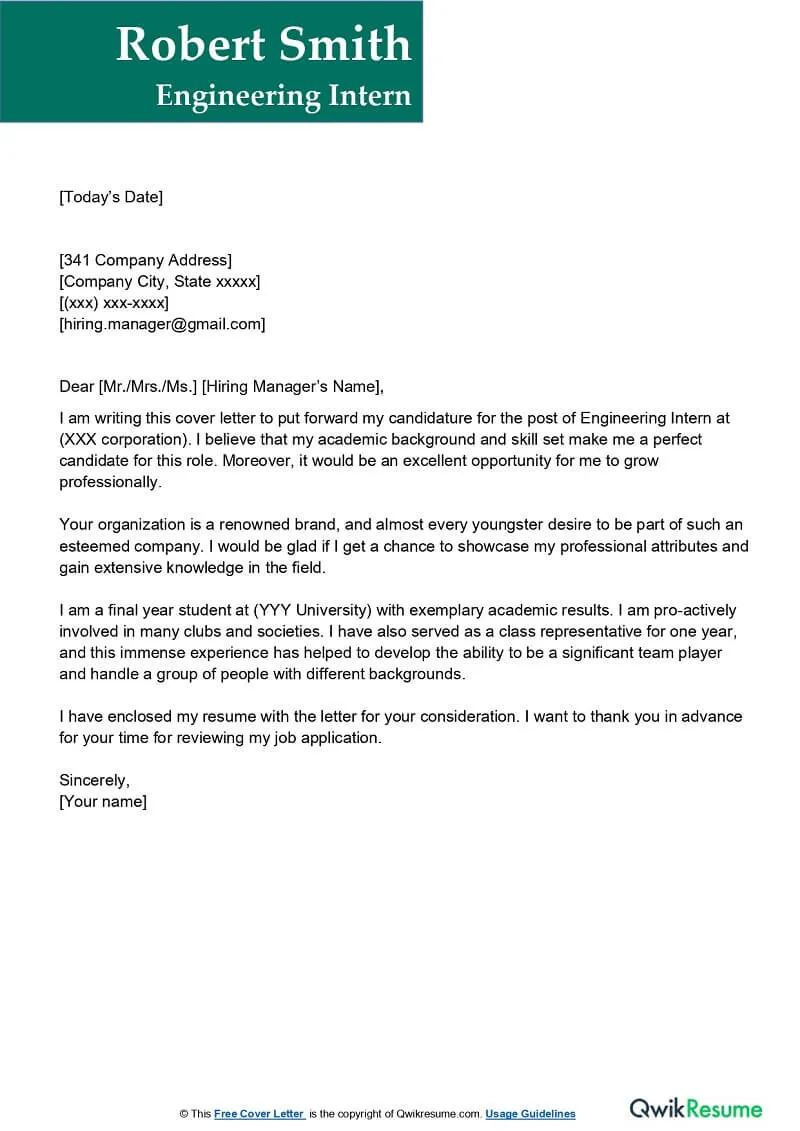
The formatting of your cover letter can significantly impact how it’s received. A well-formatted letter is easy to read and visually appealing. Use a clear and professional layout to ensure your qualifications are easily accessible. Avoid any distracting formatting elements.
Font and Spacing
Choose a professional and readable font, such as Times New Roman, Arial, or Calibri. Use a font size of 11 or 12 points. Ensure consistent spacing throughout the letter. Use single spacing within paragraphs and double spacing between paragraphs. Proper formatting makes the document easier to read, which increases the likelihood that the reader will absorb the message.
Length and Structure
Keep your cover letter concise and focused, ideally within one page. Use a clear and logical structure. Divide your letter into distinct paragraphs, each addressing a specific aspect of your qualifications and interest. Use a professional business letter format, including a salutation, body paragraphs, and a closing paragraph. A well-structured letter is easy to follow and highlights the most important information. This will make the document flow better.
Final Thoughts and Call to Action
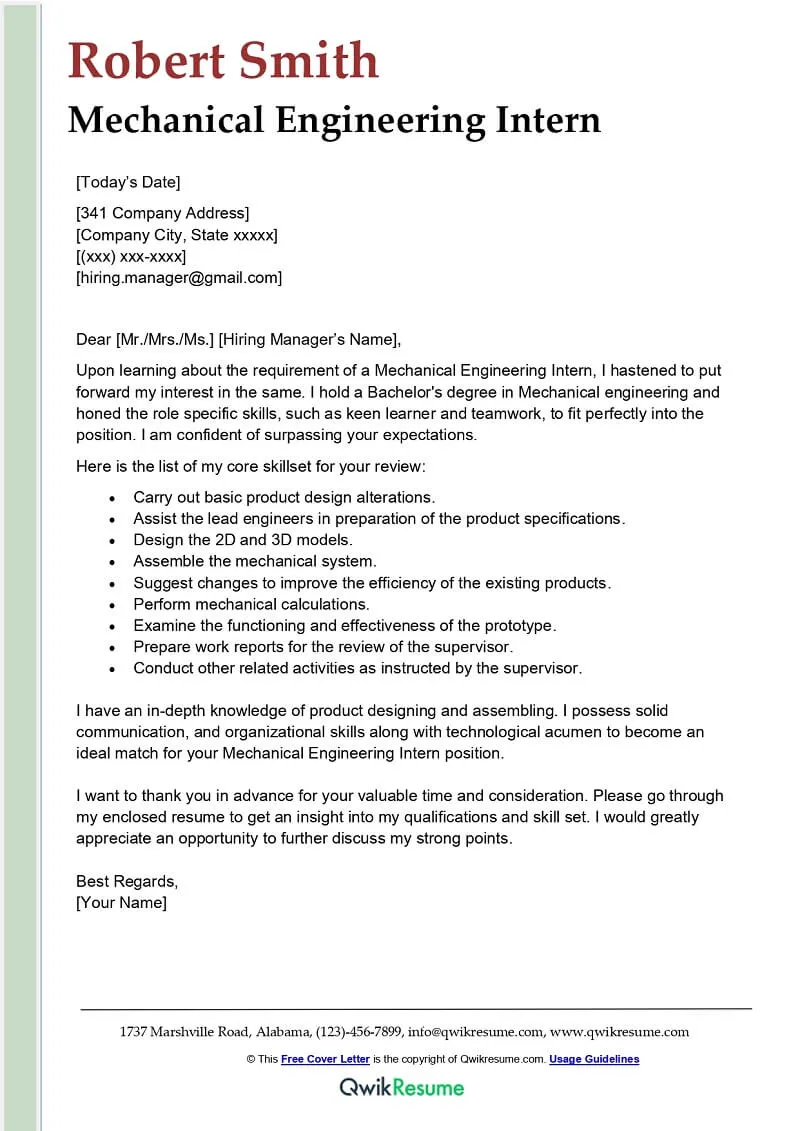
In your closing paragraph, reiterate your interest in the internship and thank the reader for their time and consideration. Include a call to action, such as inviting them to contact you for an interview or to discuss your qualifications further. End with a professional closing, such as “Sincerely” or “Respectfully,” followed by your typed name. This is your last chance to leave a positive impression.
Common Mistakes to Avoid
Avoiding common mistakes can significantly improve your cover letter’s effectiveness. Be mindful of these pitfalls to ensure your application stands out for the right reasons.
Using Generic Templates
Avoid using generic cover letter templates. Hiring managers can easily spot these, which makes your application seem impersonal and less likely to be noticed. Customize your letter to match the specific requirements of the internship and highlight your unique qualifications. A personalized cover letter shows your genuine interest and effort, increasing your chances of selection. Tailoring your letter to the job is key.
Typos and Grammatical Errors
Typos and grammatical errors can create a negative impression, making you appear careless and unprofessional. Always proofread your cover letter carefully before submitting it. Ask someone else to review it as well. Ensure the letter is free of any spelling mistakes, grammatical errors, and punctuation issues. A polished and error-free cover letter demonstrates attention to detail and professionalism, which are essential in the engineering field.
Failing to Tailor the Letter
Failing to tailor your cover letter to the specific internship is a common mistake. Demonstrate to the hiring manager that you understand their needs and how your skills align with them. Customize your letter to highlight the relevant skills and experiences that match the internship’s requirements. Show that you’ve researched the company and are excited about the opportunity. This will help you stand out from other applicants. Tailor the letter to the company’s values and goals as well.
The Conclusion
A well-written cover letter is an essential part of your application for an engineering internship. By following these tips, you can create a compelling cover letter that showcases your skills, experience, and enthusiasm, ultimately increasing your chances of landing the internship you desire. Remember to tailor your letter to each position, proofread it carefully, and highlight your unique qualifications to make a lasting impression on the hiring manager. A good cover letter will help you stand out among the crowd and get you closer to your internship goals. Good luck with your applications!
